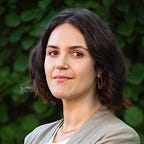Free Expression and Creativity, by Jessica Fjeld, Berkman Klein Center for Internet & Society
Twitter: Jessica Fjeld
At a time when disinformation, conflict, and disease have the world’s attention, it’s important to recall that the urgency for protecting free expression extends beyond facts and opinions to include art and creativity. Humans have always understood — and those living under repressive regimes feel acutely — that art sustains us and points the way forward, through this difficult day and toward a better future.
On World Press Freedom Day, and every other day of the year, protecting human creativity is a topic close to my heart. I became a lawyer so that I would have something material to contribute — other than my own poems — to culture, and I came to the Berkman Klein Center for Internet & Society in large part because of its longstanding recognition of the significant contributions of artists, writers, and musicians to our understanding of technology. Through the Harvard Law School Cyberlaw Clinic, we offer pro bono legal services, such as our Cyberlaw Guide to Protest Art, which support individuals and nonprofits’ rights to free expression and sustain a robust and inclusive online ecosystem.
These past few months, as I’ve gone about my work, representing clients, teaching students, and researching responsible AI, there’s a poem by Muriel Rukeyser that I’ve been reading and re-reading. If I weren’t about to tell you it was written in 1968 (it was) you’d think it was from yesterday. She writes, echoing my own reality:
Most mornings I would be more or less insane,
The newspapers would arrive with their careless stories,
The news would pour out of various devices
Interrupted by attempts to sell products to the unseen.
(Perhaps the most significant difference brought on by the passing of decades is the degree to which we are now in fact seen, or at least closely profiled, by advertisers.) In her dizzying environment, Rukeyser sits down to write to us, to the people of the future, with our “nameless way of living,” our “almost unimagined values.” She tells us in this poem that what she wants to do with her writing is to bust through the calcified habits of thought that are trapping her, but are also trapping all of us, and trapping the journalists writing those careless stories, the advertising executives, the soldiers, everyone. Rukeyser and other artists “try by any means / To reach the limits of ourselves, to reach beyond ourselves.”
How artists push boundaries makes them dangerous to entrenched power structures and established hierarchies. The arts are means of driving connection, and acknowledging difference. They are a forum for marginalized and oppressed voices to express sideways, through metaphor and other devices, what can’t be said straight. As the Russian poet Vladimir Mayakovsky — whose relationship with the Soviet state was fraught, and who committed suicide at age 30 — acknowledged in his poem A Talk with a Tax Collector:
the rhyme of the poet
is a caress
and a slogan
and a bayonet
and a whip.
The new wave of nationalist and authoritarian leaders around the globe have their eyes on the artists, and unfortunately, the same technological tools that facilitate creative exchange can also be used to facilitate surveillance and control. From the birth of the Internet, there have been wildly varying perspectives on how to maximize the benefit of ICT technologies, while minimizing or avoiding their harms. No one’s come close to a clean solution. That’s why I’m convinced that the GNI’s work, in bringing together companies with civil society, academics, and socially responsible investors, is essential. The work we do, in trying to stay a step ahead of an ever-evolving technological and socio-political landscape, reminds me of a short, and deeply wonderful, poem by June Jordan, Calling on All Silent Minorities:
HEY
C’MON
COME OUTWHEREVER YOU ARE
WE NEED TO HAVE THIS MEETING
AT THIS TREEAIN’ EVEN BEEN
PLANTED
YET
I’m not sure my GNI colleagues would accept this poem in lieu of a more traditional invitation to our Q2 2020 board meeting, but I do think that the GNI Principles, as well as our work in learning and policy, are the seed of a significant tree, one that will ensure that the art and expression of the coming decades is as vibrant, essential, and accessible as that of the past.
